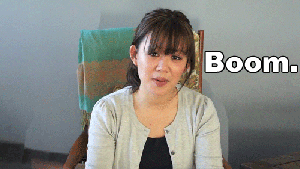I am a YouTube fanatic, there I said it. I love videos, great editing and the community of those who make videos as well as their audience. There are many examples of Diaspora when it comes to those who post content on YouTube, some that were mentioned in the lecture are some of my favourites. Natalie Tran from Community Channel and Lilly Singh from IISuperWomanII are both excellent examples of the representation of their culture from another part of the world.
A quick google search for some other Asian YouTubers (Mostly those who are living in another country) brought up search results and so many I already knew and was already subscribed to. To name a few that you would find on my subscription feed, Michelle Phan, Lindy Tsang, Its Judys Life, Hey Claire and LaurDIY.
This is such an interesting observation, the fact that I had never really connected their heritage and culture to their content and videos struck me as really interesting. Even though these YouTubers would even discuss their culture in some videos, I had never thought of them as a peripheral group. Often they make fun of their culture and play on stereotypes, the reason I can relate to this is it’s often based on family life. From the protective mother to the grandmother who can’t understand technology, this all resonates with me as I’m a 20 year old still living at home. Even if it didn’t resonate with me personally I think the way they present it is interesting and entertaining. In saying that though, I love being able to hear them make fun of themselves, I think that’s having a really great sense of humour.
There are many websites that discuss great Asian YouTubers to watch, so there is clearly a market out there for people who want to connect with a specific cultural group. After some more intense research (Google) There were SO many articles about Asians “taking over” YouTube, some were negative and some were really positive about many different cultures being represented online. You can read some of these articles (Here, Here and Here).
My experience with YouTube is a long and winding road, one that will probably never end. The experience I have with diasporic groups on YouTube has been even great, considering I am able to see a PERSONAL view and experience of a specific person, perhaps it has a lot to do with their culture or perhaps its just about being a certain age or gender. Reflecting on my thoughts of stumbling across much of this information is that I shouldn’t really be surprised that there is a market for people seeking anything, really.

my mother in law keeps watching ‘it’s judy’s life’ 😀
LikeLike
Its so addictive! They are such a sweet family 🙂
LikeLike
she just wants grandchildren so much, she speaks no English – she does that only because of that haha 🙂
LikeLiked by 1 person
I find it kind of funny that people seem to be moving away from content coming straight from Asia and moving towards analyzing content made by those of Asian heritage that grew up in another country. I think it’s worth thinking about the different degrees of ‘Asian’ and what people personally consider to be ‘Asian’ or as I like to call it ‘Asian enough’, after all ‘Asian’ is a blanket term used to describe a whole lot of people and cross cultures that might get a little confusing. I myself am Australian Filipino and find that whether people like to consider me Asian or Australian depends on the context, for example if they’re talking about Chinese culture I am apparently no longer Asian (because apparently since I don’t have the ‘Asian eyes’ I’m not legit), but if someone needs to know how to use a rice cooker I am Asian yet again. The best part is that people keep forgetting that countries like Pakistan are a part of the continent of Asia. Asian – does anyone really know what it is?
LikeLike
You can take it two ways.
1) You can be of Asian decent but born in Australia – speak only English and know nothing about you heritage. Are you still classed as ‘Asian’?
2) You can be of Asian decent born in an Asian country – speak only your own language (e.g Chinese).
Or actually, there could be a third point…
3) You are of Australia decent but you are born in an Asian country and brought up with Asian values but technically you are not Asian.
When we are researching into this topic you need to consider these aspects just because a person is Asian doesn’t mean they know anything about the culture (reference to person subgroup 1) If you researched them you would just find out the same sort of information as any other Australia, right? If thats what they have been subjected to. Anyway! It is interested to see the many different types of Asian cultures, whether they be 100% Asian or not.
LikeLike
You mentioned briefly the negativity received from this idea of “asians taking over”. I think you should run with that a bit more and evaluate how the negativity of Asian culture, especially in Youtube cultures, is being received in the Asian nations they may be specifically directed to. Racism or any form of negativity is in it’s prime form on Youtube and it would be really interesting to delve into this further especially because it’s in relation to Asian media and culture.
LikeLike